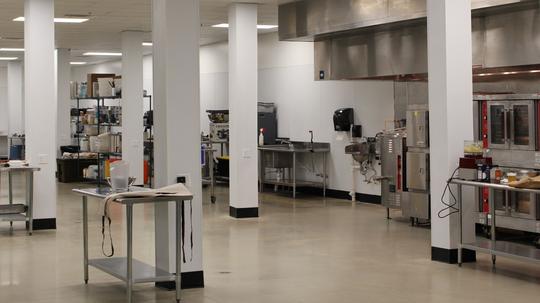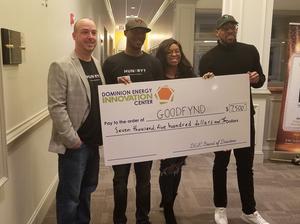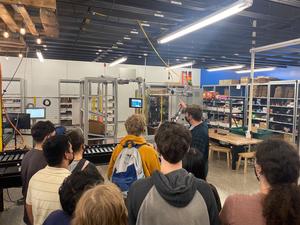
In the case of Hatch Kitchen RVA, the chickens came long before the egg.
In the South and beyond, Richmond is well known for its culinary scene. Stand on almost any street corner and a stone’s throw away will be a restaurant, a take-out joint or some small storefront hawking food or drink.
So densely packed is the city’s food map that it seems there would be a driving force behind it: one central node churning out enterprises at a steady pace.
But in spite of appearances, it wasn’t until this winter that such a space had matured enough to break through its shell.
On Feb. 12, Hatch Kitchen RVA, the city’s first food and beverage incubator, celebrated its grand opening by unveiling of its 9,000-square-foot communal commercial kitchen.
“We think it’s going to be central to creating businesses related to food up and down the street,” said Rick Gregory, principal with Lynx Ventures. The developer is driving the revitalization of Clopton Siteworks, where Hatch Kitchen occupies one of 26 vast structures that previously housed tobacco-drying operations for Philip Morris.
“It’s a great opportunity for people in the food business to be able to make their product without having the great investment it takes to have a commercial kitchen,” said Gregory.
Although Hatch Kitchen actually opened this January, the Feb. 12 event marked its official start in the market and gave both the food and beverage and startup communities a chance to see what’s brewing in its halls.
“Sure enough there’s no shortage of really interesting companies,” said Brad Cummings, a co-founder of Hatch with Austin Green.
Six companies have already inked deals with Hatch to use its space, and Cummings said an additional 15 to 20 leases are being ironed out.

Just over half of Hatch’s 20,000-square-foot space was up and running at the grand opening. Cummings said there were “active plans” for the remaining sections that for now are concealed behind a floor-to-ceiling partition. Blueprints call for these additional sections to be broken into 400- to 500-square-foot spaces for companies that are looking to move to the next level of operations.
Hatch tenant Kim Baker of Kim Baker Foods, which will be launching its lentil-based Pro-Chi protein enhancer product this March, said that access to the incubator’s space increases her production capacity fourfold, and, to boot, “It also has created a community.”
That focus on community was part of the Hatch plan from the start.
“Anyone can build a large-scale commercial kitchen, but we call this an incubator,” said Cummings. What differentiates Hatch, he said, is the framework of support that it offers to fledgling businesses—access to opportunities at Startup Virginia (where Cummings sits on the board of directors), a pool of 65 mentors in the food and beverage industry and an overall atmosphere of creative collaboration.
“Everyone knows everyone,” said Hatch member Xavier Meers. Meers has seen the space evolve: his company, the local favorite Nightingale Ice Cream Sandwiches, was the first to sign onto the enterprise when Cummings and Green got started.
For Cummings and Green, seeing the space in full swing was the proverbial cherry on top.
“The fact that you can see companies in here using the kitchen, that’s why we’re here,” said Cummings.
Startups at Hatch Kitchen RVA:
- Meltdown – Grilled cheese food truck
- Nightingale Ice Cream Sandwiches – Homemade ice cream sandwiches
- SSUPP Foods – Dips and spreads made from sunflowers
- Kim Baker Foods – Cooking classes and production of Pro-Chi
- Redemption BBQ – Sustainable barbecue in the slow food tradition
- Gaucho – South American food truck




